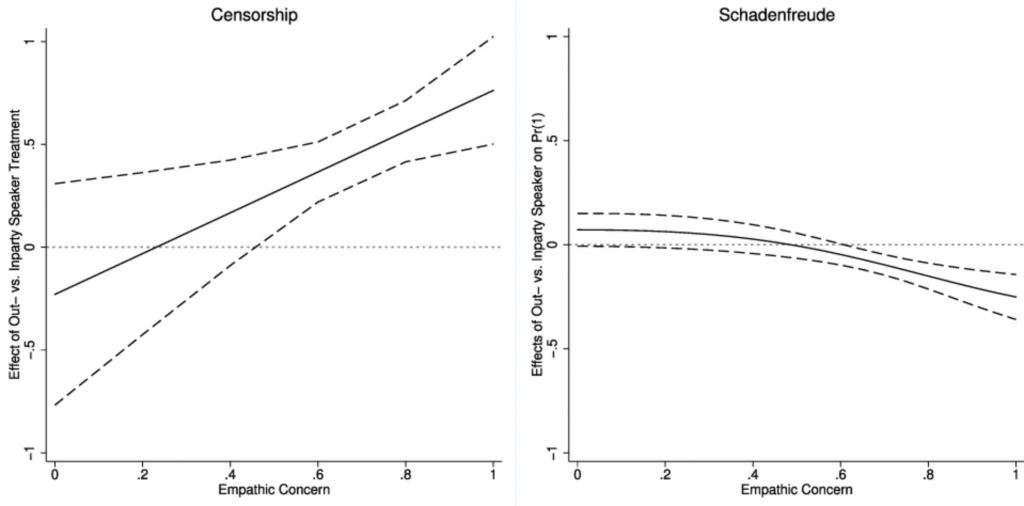- Facebook279
- Twitter1
- Total 280
In a new article,* Elizabeth Simas, Scott Clifford, and Justin Kirkland provide evidence that empathy is not a solution to partisan polarization in the US. Quite the contrary: people who demonstrate more “empathic concern” are more likely to blame the opposite party for the suffering that they see in the world, hence more likely to decry the other party, to favor censoring it, and to exhibit Schadenfreude (pleasure at others’ pain) when members of the opposing party lose out.
Part of the article involves an experiment with undergraduate subjects. Students are shown a story in which “campus police had to shut down a group of partisan students who were protesting a speech to be given by an individual known for making inflammatory comments about that party. In both versions, a bystander who was attempting to hear the speech was struck by a protestor. And in both versions, the protestors succeeded in getting the speech canceled.” Students were assigned to see versions of the story that randomly varied the partisan identities of the speaker, the protesters, and the bystander.

Students who scored higher on a general measure of empathetic concern were more likely to favor censoring the inflammatory speaker, and more likely to be glad that the bystander was hurt. These results were the same for Democratic and Republican students.
It rings true for me that deep emotional concern is associated with anger and a distancing of intellectual and political opponents, a refusal to hear their arguments.
I’ve posted concerns about empathy several times before.** The main problem is its susceptibility to bias. Usually, empathy is felt for individuals (or concrete categories of people), and it can easily promote injustice against others. There is such a thing as universal, undifferentiated empathy, but it looks more like an ethical principle than a concrete emotion. The Buddhist objective is not empathy (as measured by questions from the Interpersonal Reactivity Index, such as: “When I see someone being taken advantage of, I feel kind of protective toward them”). Instead, Buddhism prizes equanimity, which is calm and detached.
I do not take for granted that political polarization is bad. Sometimes it is right to blame political opponents for others’ suffering. And although Schadenfreude should always be avoided, it can be welcome news when a political enemy suffers defeat. These emotions of blame and satisfaction are appropriate if and when the opponent is actually at fault. To find out whether someone is actually wrong requires engagement with that person’s arguments and reasons. Censorship defeats such engagement and is almost always a mistake. It’s troubling that more empathy means more support for censorship, especially if that exemplifies a deeper problem with empathy. Perhaps empathy discourages us from hearing alternative views by fixing our attention on concrete suffering.
*Simas, Elizabeth N., Scott Clifford, and Justin H. Kirkland. “How Empathic Concern Fuels Political Polarization.” American Political Science Review 114.1 (2020): 258-269.
** Civility, humility, tolerance, empathy, or what?; Empathy and Justice; how to think about other people’s interests: Rawls, Buddhism, and empathy; “Empathy” is a new word. Do we need it?; empathy, sympathy, compassion, justice; empathy: good or bad?; empathy versus systematic thought